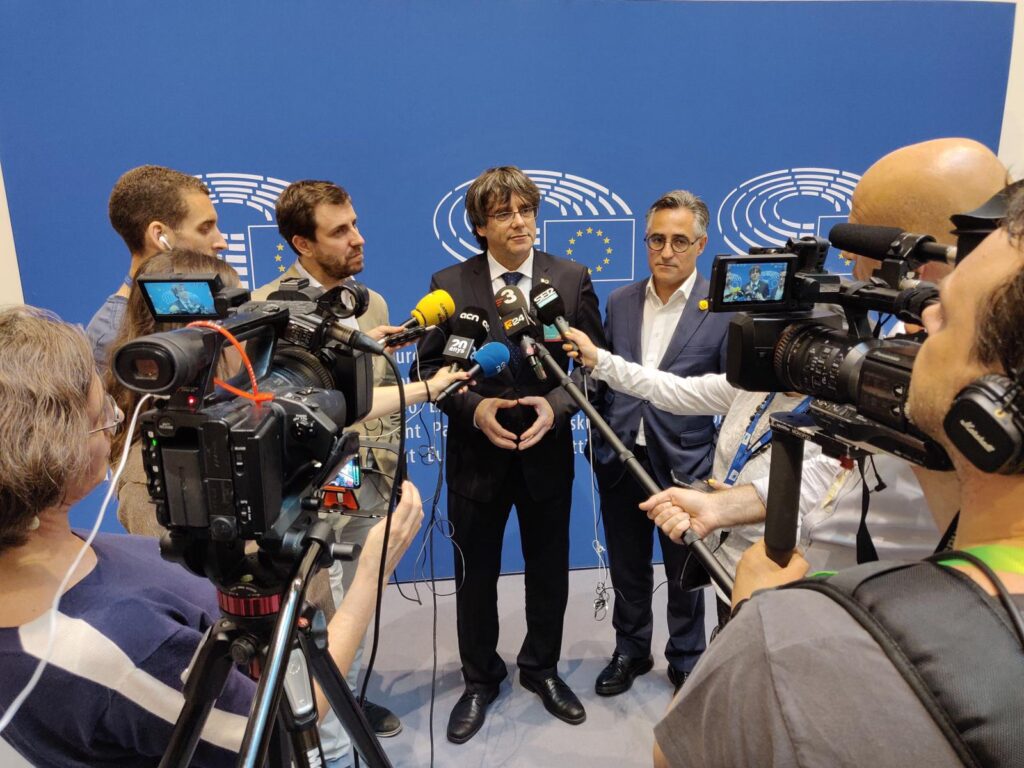11.06.2019 - 16:18
|
Actualització: 11.06.2019 - 18:18
Last week Catalan president Carles Puigdemont spoke at an event hosted in Hamburg by Die Linke, the German left-wing party. During his address Puigdemont raised two points which, although hardly new, got my attention because of the prominence they were given in the event. Readers will be able to judge for themselves by watching the video (starting at about minute seventeen).
https://www.facebook.com/ZaklinNasticMdB/videos/297611597851554/
Puigdemont states that the traditional nation state, based on the notion of “one language, one culture and one nation” has expired and that, precisely because of this and in the current state of affairs, national minorities must be afforded greater protection than ever by means of the instrument which the international community has devised to that effect: the exercise of the right to self-determination.
In the last few years, Catalan secessionism has not put enough emphasis on the right to self-determination, muddying the waters with the euphemistic “right to decide”. And it has refused to refer to Catalans as a “national minority”, despite the supporting evidence. That is why I believe that framing the narrative in those terms —the kind which the international community will recognise— is a wise move. I also feel that this shift in the independence movement’s stance is the result of the project growing stronger and tougher.
I realise that the phrase “national minority” is not one that Catalanism has traditionally embraced. For a long time, a certain arrogance had us believe that accepting that meant taking on a residual, lesser role. Actually, the opposite is true. Once you have established the fact that Catalans are a national minority in Spain and France, the right to self-determination is a given.
It is true that we do not have a precise, concrete definition of “national minority”. It is equally true that this does not always apply to a numerical minority: during the apartheid regime, blacks were the majority group in South Africa, but they were a national minority nonetheless. The definition of national minority given by the UN’s Subcommission on the Protection of Minorities fits the Catalan case perfectly: “a minority is a group numerically inferior to the rest of the population of a State, in a non-dominant position, whose members —being nationals of the State— possess ethnic, religious or linguistic characteristics differing from those of the rest of the population and show, if only implicitly, a sense of solidarity, directed towards preserving their culture, traditions, religion or language”. Following this definition, it is necessary to read the Declaration on the rights of people belonging to national, ethnic, religious or linguistic minorities adopted in December 1992 by the UN’s General Assembly, which can be found here .
I would like to draw the reader’s attention specifically to Articles 3.2 and 4 of this Declaration. Both emphasise the fact that no member of a national minority should be placed at a disadvantage because of their status, and that states must ensure that they are treated by the law the same way they would be if they didn’t belong to a national minority.
Clearly, Spain fails to comply with this requirement. For instance, Madrid sends the European Parliament a list of the newly-elected MEP so they may process their credentials, but it tries to prevent three of the representatives from doing just that. All three are members of the Catalan national minority. It is undeniable that the courts of law keep trampling over the rights of national minorities in Spain. For example, Catalans may not speak their language in court, as we have seen in the trial of the independence leaders. And, given similar incidents, criminal charges may be pressed or not depending on whether the people involved belong to a national minority. A group of Basque lads from Altsasu are facing four hundred years in jail on terror charges following a bar brawl with off-duty Spanish police officers. In contrast, a stand-off in El Rinconcillo (Andalusia), where nine Guardia Civil officers faced an armed mob of forty people and shots were fired, does not lead to a prosecution for terrorism. Furthermore, Spain’s Electoral Board attempts to ban two slates from running in the latest elections and, funnily enough, they happen to be Junts per Catalunya, a Catalan national minority candidacy, and Coalición por Melilla, an Arab and Amazigh national, religious and linguistic minority coalition from Melilla, Spain’s enclave in northern Africa. Coincidence?
https://twitter.com/_unterhaltung/status/1135804827492130816?s=20
PS: By the way, that’s Der Spiegel’s Twitter post advertising their report on Puigdemont’s Hamburg address: “Puigdemont Superstar”. The German in the tweet by Europe’s top weekly magazine is pretty easy to understand …


